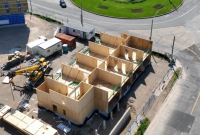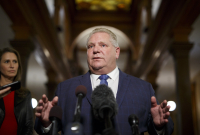Support strong Canadian climate journalism for 2025
Despite construction capacity constraints and interest rate hikes, Ontario has still had enough labour, equipment, materials, investment and land within municipal settlement boundaries to keep up with the growing number of new households.
The government has always known that shifting construction to more labour-efficient building formats and construction methods — such as wood frame midrise buildings — and building on infill sites with existing streets and infrastructure would allow those same limited resources to produce a lot more housing.
It is the government’s own NIMBY zoning, outdated construction rules and subsidies for inefficient sprawl development that have prevented both market and non-market builders from making that shift.
So why, years after the Premier promised legal reforms that would deliver “more homes faster” and 1.5 million net new homes by 2030, is the housing shortage even worse? Why are housing starts actually down, year over year? It’s because rather than ending restrictions on midrise housing and slamming the brakes on sprawl and highway schemes that squander construction, Ontario’s changes to land use planning, environmental and transportation laws and policies have done the opposite.
Soon after Premier Doug Ford took office, his government began to dismantle even the modest measures the previous government had taken to promote more efficient housing construction. Among those changes, his government:
- Reduced the amount of housing that municipalities are required to zone for inside existing neighborhoods;
- Nearly halved the number of homes required to be built for each hectare of new development land consumed;
- Pressured regional governments to expand the pre-existing glut of farmland and habitat marked for development (there were already 350km2 designated in the Greater Toronto and Hamilton Area alone) far beyond what consumed by building at reasonable densities;
- Committed billions of dollars to subsidize the most inefficient, low-density development by reviving the proposed Highway 413 and the Bradford Bypass; and,
- Tried to push sprawl into the Greenbelt itself.
Despite calls from housing and environmental experts across the political spectrum — and its own housing task force — to scrap outdated rules such as minimum parking requirements and to permit mid-rise housing on major streets throughout existing residential neighbourhoods, Ford intervened. He personally blocked efforts to legalize even 4-storey “4-plex” apartment buildings.
Ontario’s lingering and worsening housing shortage is exactly what housing and environmental advocates warned would happen if the government didn’t abandon this course. This government knew their sprawl and highway approach would make the housing crisis worse, because the experts told them, and chose to do it anyway.
In recent months, as his government’s failure on housing has become more obvious, Ford has tried to pass the buck by blaming everyone from immigrants to the Bank of Canada. What he glosses over is that the housing market could easily have adapted to population and rate changes, but has instead turned the challenge of high interest rates and the opportunity of a growing population into a housing crisis by willfully sabotaging the solutions.
The elimination of the Growth Plan for the Greater Golden Horseshoe seems calculated to snuff out some of the only rays of hope that had been penetrating the Ontario government’s obstruction on housing.
Without the Growth Plan:
- Suburban municipalities will no longer be required to ensure that even 50 homes and jobs are created for each hectare of “greenfield” farmland or natural habitat sacrificed to sprawl. The current government had previously reduced the number from 80 people to 50 people;
- Suburban municipalities will no longer be obligated to legalize enough infill housing to accommodate half (or any significant share) of their expected population growth within built-up areas; and,
- A growing share of the scarce construction labour, equipment and materials needed to deliver labour-efficient and low-cost homes — like the hundreds of thousands of mid-rise apartments Toronto recently approved on its major residential streets — will be diverted to distant sprawl subdivisions that house far fewer people.
In short, the repeal of the Growth Plan signals the end of any serious hope of addressing the housing shortage. It pushes “1.5 million homes by 2030” beyond the realm of possibility. Without a swift and radical reversal of this government’s policies, things may even get much worse.
It’s no surprise that Ford is rumored to be planning an early election before the rest of his housing policy chickens come home to roost.
Phil Pothen is a land use planning and environmental lawyer with a background in landscape ecology, landscape architecture and 10 years of experience advising and representing provincial policy-makers, select small builders, and concerned residents. He currently works as Counsel and Land Use and Land Development program manager at Environmental Defence.






Comments
It's hard to imagine that Doug Ford could be any worse - but I'm sure he'll figure out something. Much of what we lose will not come back.
It's hard to place more than partial blame on the local government when EVERY government is having trouble keeping up with housing. Lots of partial blame, for sure, though.
If there is a shortage, why are condos or home builders sitting on so much inventory they can't move? Even in my own development where I live, we have dozens of townhomes and houses sitting empty and are not selling? We have been told a baked lie about a shortage.
OK, so we all have an idea that Doug "The Thug" Ford is incompetent and only does things that would fill the pork barrels of his corrupt donors. Doug Ford has been a major failure in this province and is what you get when you vote conservative clowns at any level, they are a backward bunch, living in the past with zero fresh ideas and into their religious nonsense on what people can or cannot do with their own lives. Typical overreach, women be aware....
Now the so called housing shortage. There is no shortage despite what we are being told. Builders are stilling on a lot of inventory they can't move, even with interest rate cut incentives being offered. As I have looked around personally on what is available on the market in Ontario and the many new developments, there is a lot of empty units or homes and clearly a buyers market these days.
The real issue is affordability and the ridiculous rules to qualify for a mortgage. So someone can be declined paying what would amount to a $1,900 monthly mortgage, but we seem fine if they currently are paying $2,600+ to rent a place. Something is wrong with this picture.
The politicians and media have got the entire picture wrong about the housing market, trust me, there are plenty of units or homes available, just unable to purchase because of failed policies and rules around mortgages and ownership. Seriously, if you go out tomorrow and want to buy a a dozen condos or homes, you wouldn't have any issues to do so other than the banks and how they deal with outdated mortgage rules. There are dozens of home even in the development where I live, that have been sitting empty for months. We are being told a faux baked story and misinformation under a so called housing crisis, claiming a shortage, total BS!
One seems to forget that Ford, like PP, Higgs Smith and Moe are neoliberals. Profit is what counts, so sprawl, more land, more utility installation, more roads to build and maintain is the goal. More privatization of those services creates more profit from public money [taxes].
They have little concern with people. It's that market that counts! Even though our market based politics and economy has failed, this failed market everything has failed and Conservative leadership has no leadership capabilities of doing something better. Same old, same old!
Thank you for this first rate piece of journalism. I think it outlines the utter chaos that characterises so much of what Ford and his government does. And subsequent generations of Ontarians are going to suffer as a result, and in so many ways. At any rate, thank you, Mr. Pothen, for providing us with more evidence of this government's incompetence.